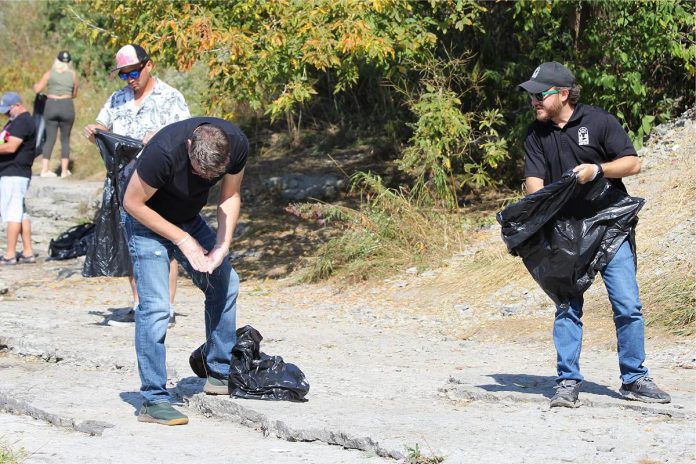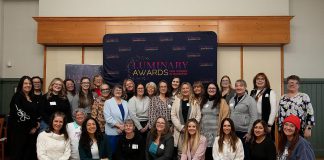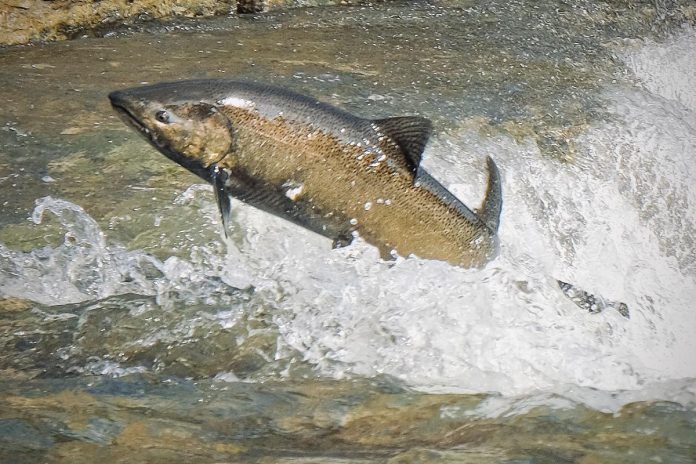
An online petition calling for more regulations around fishing in the Ganaraska River in Port Hope has surpassed its initial goal of 10,000 signatures within a week. The petition, which was launched on October 3, is now aiming for 15,000 signatures.
Organized by well-known Port Hope resident Sean Carthew, the petition on change.org is calling for fishing to be “shut down” between the Corbett’s Dam and the CN bridge (Robertson Street Bridge). The petition comes in response to the growing number of anglers who visit the region to catch large numbers of salmon during the annual salmon run.
Every fall, salmon and trout leave the cold waters of Lake Ontario and begin a journey upstream through rivers, creeks, and streams to reach their spawning grounds. The most common salmon species in Ontario are chinook and coho salmon.
“The amount of fish being taken or discarded for roe has turned into nothing short of a tragedy,” reads the petition, which later adds, “We cannot let this continue. The fishing and lack of respect for the river has gotten out of hand.”
The call for change comes following the October 1st community river clean-up, organized by Port Hope councillor Adam Pearson through his business Queenies Bake Shop. Running for over a decade, the clean-up is done each year after trout and salmon fishing season comes to an end on September 30. This year, around 70 people came out for the clean-up — the most ever.
“I was flabbergasted at the amount of garbage,” says Carthew, noting that he and his girlfriend alone picked up upwards of 40 to 50 fishing hooks and collected two bags full of fishing lot. “Times that by the 70 people out there and we’re looking at 2,500 to 3,000 hooks in a little area. It’s not safe. It’s disgusting.”
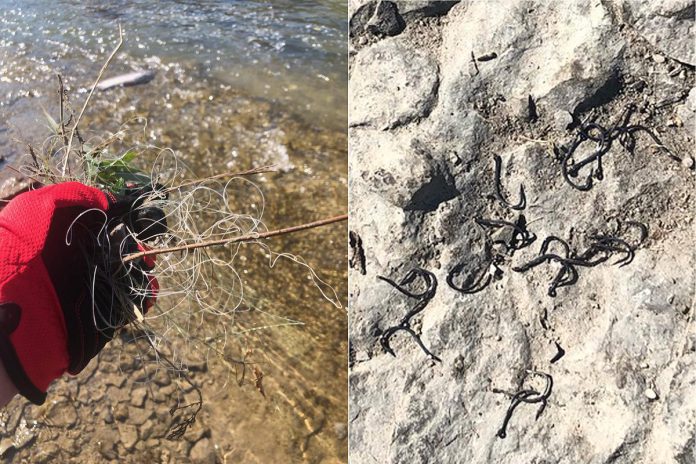
An angler himself, Carthew has been fishing from the river his whole life and in the past few years has noticed an increasing number of people “not respecting the river” by overfishing, netting, and snagging.
He attributes the increase to people coming from out of town who are drawn to the low water level, high volume of salmon, and lack of trees along the river — especially during the salmon run when as many as 20,000 fish are swimming upstream.
“It’s so easy to fish down there,” Carthew explains. “It’s almost too accessible. The fish are too vulnerable, and people are taking advantage of it.”
The petition points out that it’s not just the fish that are impacted by the fishing — Port Hope’s tourism is dwindling because many residents and visitors who want to watch the salmon run or fish themselves don’t want to see the “butchery.”
“It’s probably quite upsetting if a child who wants to go fishing sees someone with coolers full of salmon, or decapitated salmon, along the river,” notes Carthew. “If there was no fishing in that section, people coming to watch the salmon (run) would be epic.”
If blocking the river from fishing completely is not a viable solution, Carthew has other recommendations, including moving the dates of fishing season so it closes before the salmon run, only permitting fly fishing, or only permitting single barbless hooks to take away the snagging. He also suggests more policing, although he recognizes the Ontario Ministry of Natural Resources and Forestry is short-staffed.
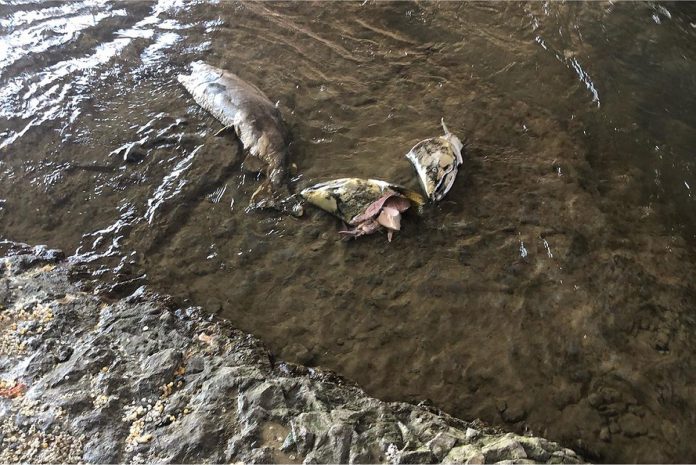
Some of the petition’s supporters suggest the ministry work with First Nations.
“Fish are relatives, not resources,” writes one petition supporter. “If the City (of Port Hope) or the Province is considering change, then I’d suggest working with First Nations in the territory. This can be so much more than just protecting stocked salmon. Help turn the City’s Land Acknowledgement into action.”
Carthew notes that, if the municipality were to shut down the section of the river during the salmon run, it could alternatively be used as a sanctuary or educational opportunity, similar to the Run Salmon Run Festival he has organized on September 10.
During that event, more than 200 people dressed in pink crowded the streets for Party in Pink, followed by an afternoon festival of crafts, food, live performance, activities and educational booths from the Ministry of Natural Resources and Forestry and the Ontario Federation of Anglers and Hunters.
“It’s a beautiful positive day around the salmon run and that’s why I created that festival, because it was just negativity in town,” Carthew explains. “A lot of people aren’t fishing, they’re just doing illegal things down there, so we needed to have a positive thing in town.”
Carthew’s petition saw immediate support, with local signers leaving comments to point out the other impacts of the fishing on the community like the smells of the “irresponsible discarding of fish,” the “impact on wildlife,” and the inability to access the river due to crowds of anglers.
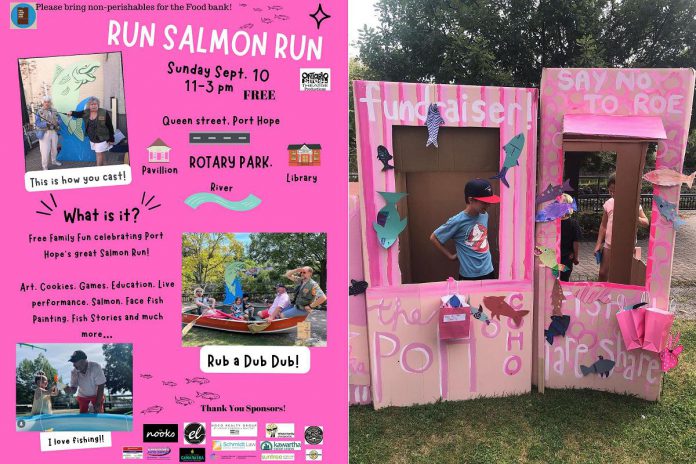
Other supporters, many of whom are anglers themselves, suggest they can’t even call the practice fishing due to its unethical and disrespectful nature.
“It’s absolutely disgusting, the way these so-called anglers are fishing,” writes one petition supporter. “It’s not sporting to stand in a shallow pool of water with hundreds of salmon dying while they try and spawn.”
Other commenters, however, argue that removing access to this region of the river will just result in the same problems existing in other areas. Carthew disagrees.
“It’s so easy here in town,” he points out. “If they’re going to a river that’s not as easy — with the high river banks, it’s tough walking — I don’t think they’ll go. People are just really taking advantage of the situation here and I don’t know if we stopped that, it would spill over into other rivers.”
While Carthew explains the petition will be used to help Port Hope council come up with a solution, he suggests it could also be used by the Ministry of Natural Resources and Forestry and Ganaraska Region Conservation Authority.
It’s clear the concerns are already being heard, as the future of the river during the salmon run was brought up at the latest Port Hope council meeting held on October 3. While no solutions have been discussed yet, there was recognition of the need for change.
“I’ve done some preliminary outreach to the Ontario Ministry of Natural Resources and Forestry, but it’s clear that the status quo is not going to be tenable for the future,” said Port Hope Mayor Olena Hankivsky at the meeting. “We are working on a plan for the future, and we do not want to see a repetition of what happened this year.”
